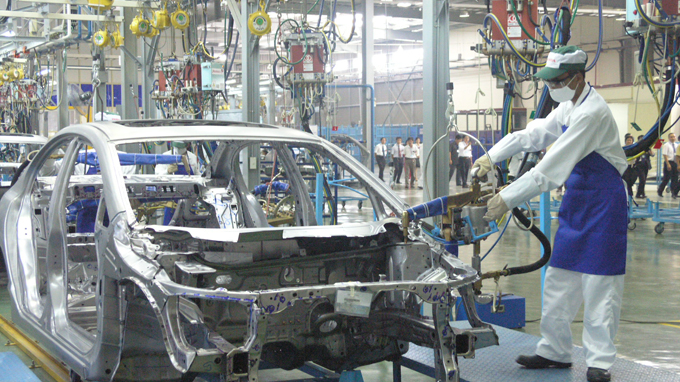China's slowing economic growth is weakening momentum throughout the rest of Asia, the Asian Development Bank said Tuesday as it revised down its forecasts for the region.
A day after Beijing released data showing its economic growth slowed for a second successive month in April-June, the ADB trimmed its outlook for developing Asia this year to 6.3 percent growth, from 6.6 percent.
In the update to its annual Asian Development Outlook publication, first published in April, the bank also pared its 2014 forecast to 6.4 percent, from 6.7 percent.
"The drop in trade and scaling back of investment are part of a more balanced growth path for (China), and the knock-on effect of its slower pace is definitely a concern for the region," the bank's chief economist, Changyong Rhee, said in a statement.
"But we are also seeing more subdued activity across much of developing Asia," Rhee added.
The update for this year is only a little better than what the bank described in the report as the region's "relatively sluggish" growth of 6.1 percent last year.
Developing Asia groups 45 nations or territories from Central Asia through to the Pacific islands, but excludes Japan.
The report cited a marginally better outlook for the advanced economies, particularly Japan where it said monetary and fiscal reforms by Prime Minister Shinzo Abe appear to be bearing fruit.
However, this did not lead to stronger demand for Asian exports, with even Southeast Asia, the bright spot in early 2013, no longer faring as well.
"Southeast Asia's strong start to the year is being tempered by slower growth in (China) and continued weak demand from advanced economies for its exports," it said.
China said Monday its economy expanded 7.5 percent in the second quarter, following 7.7 percent in the previous three months and 7.9 percent in October-December.
This "points to slow but persistent growth deceleration" amid moderating industrial production and weaker investment growth, the ADB said.
Turbulence in China's domestic interbank market in June also raised funding costs, it noted.
"This could further weaken investment in the remainder of the year, undermining growth at least in the short term."
The bank now sees China's economy growing 7.7 percent this year and 7.5 percent in 2014, helped by consumer confidence remaining high and retail sales picking up.
But both figures are lower than its April forecasts of 8.2 percent and 8.0 percent. The Asian economic giant grew 7.8 percent last year.
It said East Asia should grow 6.7 percent this year and next, with both Hong Kong and Taiwan hit hard by the slower Chinese economy.
The ADB now forecasts Southeast Asia's economies to expand 5.2 percent this year, down from 5.4 percent.
It also trimmed its forecast for South Asia to 5.6 percent this year as India, its largest economy, stuttered.
"In India, slowing fixed capital formation, weak industrial activity, and plodding progress on reform are weighing on the economy," it said.
The bank lowered its growth forecast for India this year to 5.8 percent, from 6.0 percent. The country's economy grew 5.0 percent last year.
On a positive note, the ADB said slower GDP growth helped the region contain inflation, while expanded global natural gas production put a lid on energy prices.
The bank lowered its inflation forecasts for developing Asia to 3.5 percent this year and 3.7 percent in 2014, the latter on par with the 2012 rate.
cgm/mm/dan


















































